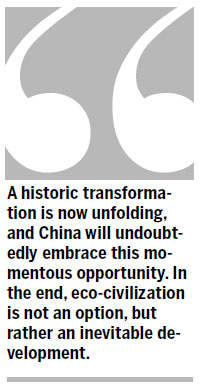
In the inevitable transition to a global green economy, emerging economies should have greater say in decision-making
In the past 20 years, though global achievements have been made in the provision of healthcare, education and the alleviation of poverty, the progress has been very slow in terms of the goals set by the Rio Summit in 1992. And the world has been facing increased eco-security, climate change, biodiversity and sustainable development challenges since then.
Worse, the uncertainties in the current financial economy have overshadowed the efforts that have been made and have put the focus on survival rather than the environmental crisis.
The current consumption model is destroying the Earth's life-support systems, ecosystems and the environment. Communities, organizations, and countries have failed to sufficiently explore sustainable solutions to cope with food security, biodiversity loss, and environmental challenges. The excessive consumption model and unsustainable lifestyles, which originated with the New Deal program launched by former US president Franklin Roosevelt to stimulate recovery in response to the Great Depression, are not sustainable. With a global population expected to rise from 7 billion to 9 billion by 2050 and the challenges posed by a deteriorating environment and climate change, it is imperative that societies make the transition to a green economy.
Delegates spent enormous time and energy on the green economy in the preparatory negotiations for Rio+20, the United Nations Conference on Sustainable Development held in the Brazilian city of Rio de Janeiro on June 20-22. Though concerns exist that a green economy may justify trade protectionism, there is little doubt that a green economy is the only way forward and that all countries will have to make the transition in the coming decades.
As a recent UN report highlights, green economies are an engine of growth, create jobs and are critical to eliminating persistent poverty. Already, the European Union and Canada regard a green economy as an opportunity for a new industrial revolution to drive their economies and they pushed the topic aggressively during the negotiations.
A historic transformation is now unfolding, and China will undoubtedly embrace this momentous opportunity. In the end, eco-civilization is not an option, but rather an inevitable development.
Unfortunately China's sustainable development faces grave challenges, ranging from fragile ecosystems and a degraded environment to resource constraints. However in terms of developing a green economy, China has its own unique advantages, thanks to the nation's efforts to promote new technologies and new energies.
With the development of a green economy, the previous rules of the game will be changed and new rules and standards will need to be established. For instance, carbon trading is increasingly emerging as a fast growing money-making business.
As the global balance of power shifts eastward, global production and consumption have steadily moved to the East as well. Given these shifts in economic clout, emerging economies such as China should have a greater say and decision-making power in the process of creating a new, global green economy or low-carbon economy. No longer should this process be solely dominated and designed by Western countries that have historical responsibilities for global warming that they are unwilling to shoulder.
Following the Rio+20 conference, the outcome document, The Future We Want, also leaves room for major groups, including NGOs, businesses, media, and local authorities, to participate in the ongoing efforts to achieve sustainable development goals.
Rio+20 was the first time that non-state actors joined with government delegations in the formal negotiations. Thousands of participants, including NGOs and other groups, actively contributed to the Rio+20 discussions on how best to reduce poverty, improve human welfare and ensure sustainable development.
China's NGOs not only hosted a series of side events during the Rio+20 summit, they also demonstrated their willingness and capability to be deeply involved in the global framework of sustainable development by aggregating the interests of all stakeholders, including businesses, local authorities, media, academia and NGOs.
Eco-Forum Global, for example, brought a delegation composed of business and local government representatives. The representatives from Guiyang, the capital of China's southwest poverty-stricken province of Guizhou, and the comparatively underdeveloped city of Suqian on the east coast, presented their achievements in green development.
Like many other organizations, Eco-Forum Global gave a voluntary commitment at Rio+20, which has been recognized by the United Nations and listed in the files of the conference. It has committed to be a reliable platform for knowledge sharing, open dialogues and debates, and will serve as a bridge to help cities and enterprises find good solutions, best practices, and policies for the big transformation to an eco-civilization.
The author is the executive chairman of Eco-Forum Global which is operated and supported by a public-interest foundation incorporated in China, also a former vice-minister of education in China.
(China Daily 07/13/2012 page8)